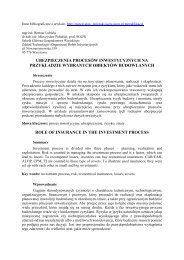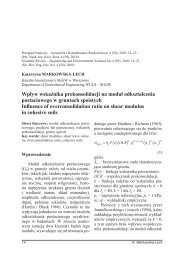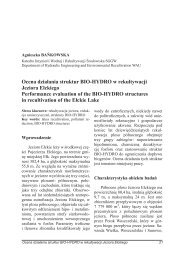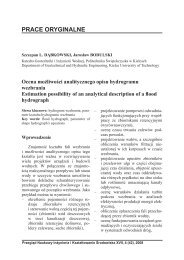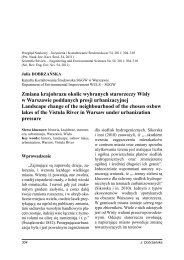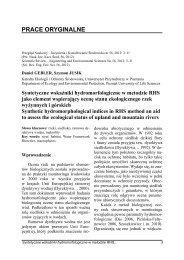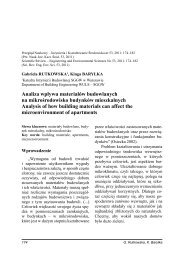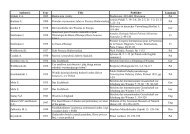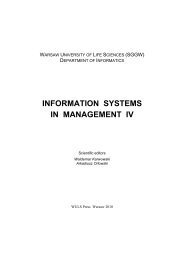ACTA SCIENTIARUM POLONORUM - SGGW
ACTA SCIENTIARUM POLONORUM - SGGW
ACTA SCIENTIARUM POLONORUM - SGGW
You also want an ePaper? Increase the reach of your titles
YUMPU automatically turns print PDFs into web optimized ePapers that Google loves.
38 S. Kalinowskichild’s problems – problemy dziecka17,328,6unsuccessful at entry exams – dziecko się niedostało811,1lack of money – brak środków pieniężnych41,352,9child’s sufficiently educated – dziecko osiągnęłowystarczający poziom edukacji2721,82004 20070 10 20 30 40 50 60Fig. 2. The causes of abandoning education by the youthRys. 2. Przyczyny niekontynuowania nauki przez młodzieżSource: Author’s own research – 2004 and 2007.Źródło: Badania własne.Relatively low income of people with lower education living in rural areas comparingto the urban population contribute to the so-called phenomenon of brain drain [Michalski2006], i.e. the migration of better-educated youth, both from rural to urban areas andabroad. Such state of affairs can be a source of trouble for the rural population in followingyears. The tendency for rural areas to be only inhabited by people with low incomes,as well as the unfavourable way of calculating educational grants and the lack of funds insmall schools, can result in a further deprivation of the youth of the opportunity for usingextracurricular classes. Research shows that even now, parents are forced to withdrawfrom private lessons for their children and extracurricular activities. However, it is advantageousthat the percentage of households which were unable to bear the burden withinthe last three years decreased by 5.7 and 2.6 percentage points respectively (Figure 3).Knowledge has become a good, subject to economic exchange and, therefore, it determinesthe material status of households. A lower level of education is conducive to earningrelatively lower incomes. It results from the unpublished CSO data that the peoplewith academic background earn incomes higher by a third and can manage disposable incomesof 1080 PLN. Secondary school graduates earn not more than PLN 743 (Figure 4).One can therefore assume that lower incomes result from an increased competitiveness inthis group and, hence, agreeing for lower earnings for doing any available job. However,as the economic situation improves, these conditions become subject to changes. Evennow, one can notice cases of rejecting employment when earnings do not meet expectations.Lack of money and low education level result in a kind of feedbacks. A low levelof education is conducive to earning low incomes, which, in turn, limits developmentopportunities of the youth. Children from rural schools, which rarely implement extendedcurricula, are usually worse educated than their urban peers. Moreover, they are forced towithdraw from extracurricular activities and choose less prestigious schools with lowerdemand, which eventually leads to further educational limitations. Therefore, it is advisableto work on creating a complex system of scholarships for the most skilled students,a preferential system of bank loans for poorer families, financed by the state. It is alsoActa Sci. Pol.




